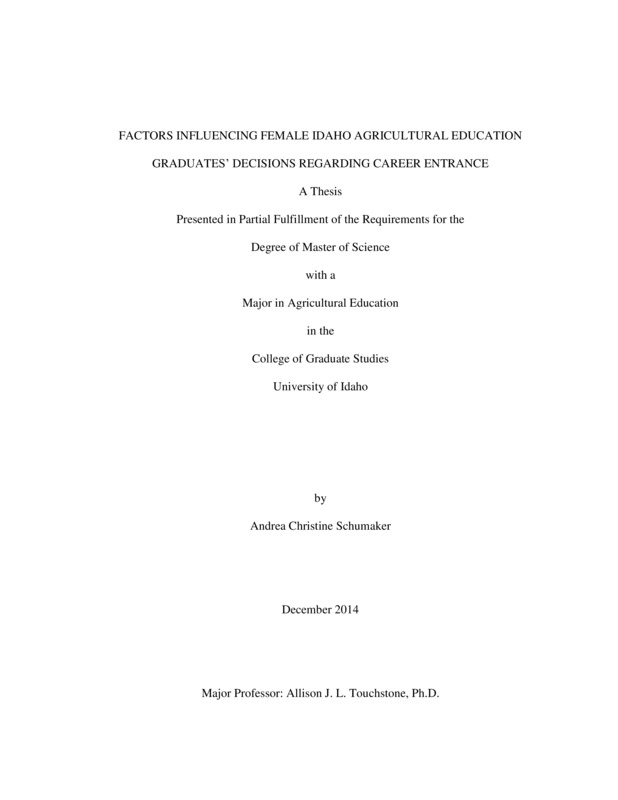Factors Influencing Female Idaho Agricultural Education Graduates' Decisions Regarding Career Entrance
Schumaker, Andrea Christine. (2014). Factors Influencing Female Idaho Agricultural Education Graduates' Decisions Regarding Career Entrance. Theses and Dissertations Collection, University of Idaho Library Digital Collections. https://www.lib.uidaho.edu/digital/etd/items/schumaker_idaho_0089n_10467.html
- Title:
- Factors Influencing Female Idaho Agricultural Education Graduates' Decisions Regarding Career Entrance
- Author:
- Schumaker, Andrea Christine
- Date:
- 2014
- Keywords:
- Agriculture Decisions Females Gender Secondary Education Teaching
- Program:
- Agricultural Education & 4H Youth Development
- Subject Category:
- Agriculture; Gender studies
- Abstract:
-
For the past three decades a shortage of agricultural educators at the secondary level has been evident. Foster (2001) stated, "In a traditional male dominated field, like agricultural education, artificial barriers based on attitudinal bias often prevent qualified women from reaching their potential.... there are very few role models for young women entering the profession" (p. 386). Whent (1993) goes on to say that probably the most common bias toward women in agricultural education was the expectation that women in agriculture want to, or are capable of, teaching only horticulture. These biases raise the question and help conclude that factors exist which serve as barriers to females entering secondary agricultural education programs or not staying within the field.
The purpose of the study was to describe the reasons why female graduates choose to either enter the teaching profession or pursue other opportunities after completing their degree in agricultural education from the University of Idaho, replicating similar studies from Arizona and Mississippi (Foster, 2001, 2003). The study results indicated that women chose not to teach secondary agricultural education was primarily because a better opportunity presented itself. Almost 50% of the respondents who are currently teaching or have taught felt they have faced barriers due to their gender.
Furthermore female graduates indicated that they were satisfied with the University of Idaho's assistance with helping them obtain a teaching position. The majority of females who choose not to teach felt their pay was better if not significantly better than if they had chosen a career in secondary education. Many of the female graduates discussed work life balance and listed family as the greatest barrier faced by female graduates.
- Description:
- masters, M.S., Agricultural Education & 4H Youth Development -- University of Idaho - College of Graduate Studies, 2014
- Major Professor:
- Touchstone, Allison J
- Committee:
- Connors, James J; Cannon, John G
- Defense Date:
- 2014
- Identifier:
- Schumaker_idaho_0089N_10467
- Type:
- Text
- Format Original:
- Format:
- application/pdf
- Rights:
- In Copyright - Educational Use Permitted. For more information, please contact University of Idaho Library Special Collections and Archives Department at libspec@uidaho.edu.
- Standardized Rights:
- http://rightsstatements.org/vocab/InC-EDU/1.0/

